ISLAMABAD: Pakistan has observed a sharp decline in polio cases this year, Pakistan's national polio coordinator said on Friday, attributing the low numbers to COVID-19 restrictions, back-to-back polio vaccination drives, improved security and the organized cross-border movement of children between Pakistan, Iran and Afghanistan.
The country reported 84 wild poliovirus cases in 2020 and 147 cases in 2019. But official data shows Pakistan only reported one wild poliovirus case since the beginning of this year.
Pakistan is one of the two polio-endemic countries in the world along with neighboring Afghanistan. Officials in Islamabad say they are optimistic about bringing the number of these cases to zero by December next year.
“The COVID-19 restrictions helped curtail movement of children and we decided to take the benefit by completing eight immunization drives,” Dr. Shahzad Baig, a national polio coordinator, told Arab News on Friday.
“Most children were easily accessible, making it possible for our teams to administer polio drops,” he said. “This also helped us overcome the virus.”
Baig informed that about 40 million children were covered in each national campaign, including four of them conducted this year.
Polio is a highly infectious disease caused by poliovirus that mainly affects children under the age of five. It invades the nervous system and can cause paralysis or even death.
While there is no cure for polio, vaccination is the most effective way to protect children from the crippling disease. Each time children under the age of five are vaccinated, their protection against the virus further strengthens.
However, Baig warned the health authorities should not lower their guard since that could result in a resurgence of virus in high-risk areas.
“We have made progress against the virus, but we don’t want to be complacent at this stage,” he said. “The virus is cornered and exhausted, which implies it is the most crucial time to administer polio drops to our children to get rid of the disease.”
Last week, the World Health Organization and UNICEF applauded Pakistan’s continued efforts to eradicate polio. The UN agencies particularly highlighted the fact that the country continued with its vaccination program amid the COVID-19 pandemic.
At the same time, the two agencies urged the government to sustain the momentum and reach every child with the lifesaving drops.
Talking about other factors behind the government’s success, the national polio coordinator said the improved security situation in the country and organized cross-border movement of children from Afghanistan also helped the polio teams reach maximum children during the immunization drives.
“Pakistan’s hundred percent area is now accessible to our teams due to the improved security situation,” he said. “Dozens of our law enforcement personnel have sacrificed their lives for the noble cause.”
He said polio vaccination teams had also been deployed at border crossings in Torkham and Chaman to administer drops to children up to the age of 10 who were leaving or entering Pakistan while traveling to or from Afghanistan and Iran.
“Vaccine refusals are now the only impediment to the complete eradication of the disease,” he said, adding that parents of about two to three percent children still refused vaccination during each immunization campaign.
“This is the major hurdle, and we are trying to overcome it with the help of religious clerics and notables of specific areas,” he continued.
According to a recent WHO report, the wild poliovirus transmission is still ongoing in traditional reservoir areas, namely the northern corridor (Peshawar/Khyber) and Karachi and the southern corridor (Quetta block, Balochistan).
The report claimed this had also led to an expansion of virus to previously polio-free areas (Punjab and Sindh) along with the detection of virus in other parts of the country.
To overcome the challenge, the government has designed one sub-national immunization campaign that will focus on high-risk areas in July and two national campaigns in September and the second week of December to eradicate the disease.
“We are aiming to bring down the number of polio cases in Pakistan to zero by December next year,” Baig added, “and we are hopeful for our success due to our progress so far.”
Coronavirus restrictions led to sharp decline in polio cases in Pakistan — polio chief
https://arab.news/g7z74
Coronavirus restrictions led to sharp decline in polio cases in Pakistan — polio chief
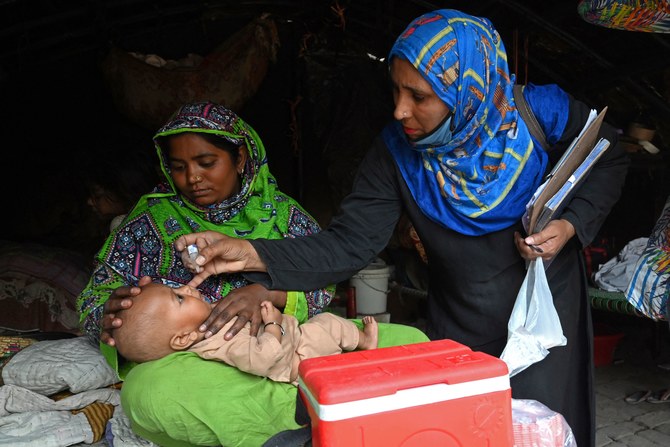
- While the country reported 84 wild poliovirus cases in 2020, it has only recorded one such case since the beginning of the year
- Health officials hope to bring down the number of polio cases to zero by December next year, though vaccine refusal remains a challenge
Pakistan Stock Exchange hits record high, breaks 72,000 points in intraday trade

- Analysts say investors expect a significant decline in April inflation data that may lead to a cut in interest rates
- The Pakistani bourse has recently been trading at record highs due to hopes of positive loan talks with the IMF
ISLAMABAD: Pakistan’s benchmark share index breached the key level of 72,000 to trade at a record high of 72,414 points during intraday trade earlier on Wednesday, according to data from the Pakistan Stock Exchange website.
The Pakistani bourse has recently been trading at record highs amid positive sentiment prevailing among investors due to hopes of the country’s successful talks with the International Monetary Fund (IMF) for a new loan program.
The country’s finance minister, Muhammad Aurangzeb, recently visited Washington to hold talks with IMF officials for a long-term bailout facility as Pakistan’s current $3 billion program is due to expire this month.
The finance minister expressed hopes the outline of the new program would soon become visible, adding that the loan would help Pakistan continue with structural economic reforms.
“After a record current account surplus, investors are now expecting a big fall in April inflation data that may result in a cut in interest rates in the coming months,” Sohail Mohammed, CEO of Karachi-based brokerage company Topline Securities, told Reuters.
Pakistan’s benchmark KSE100 index has surged 75.5 percent over the past year and is up 11.5 percent year-to-date.
The equity market is expected to surge further as an IMF delegation arrives in Pakistan next month to determine the contours of the new loan facility.
“We are still hoping that we can get into a staff-level agreement [with the IMF] by the time June is done or early July so that we can move on,” the finance minister said on Tuesday while addressing a news conference in Islamabad.
With input from Reuters
Matthews’ second century powers West Indies Women to convincing 88-run victory over Pakistan
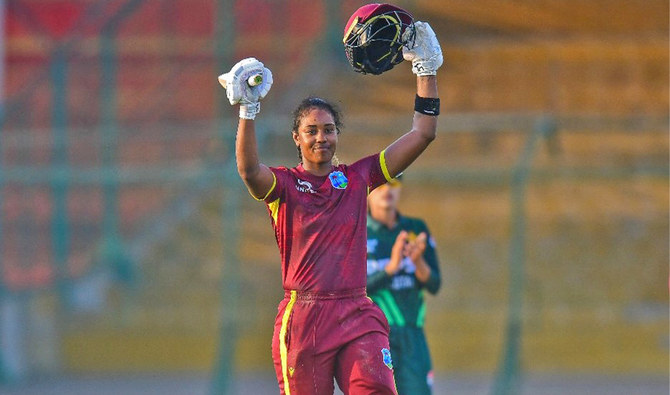
- The victory in the third ODI helps West Indies sweep the ICC Women’s Championship fixer by 3-0
- The two teams are now scheduled to play five Twenty20 cricket matches in Karachi from Friday
ISLAMABAD: West Indies Women’s captain Hayley Matthews scored her second century of the series to help her team convincingly beat Pakistan Women by 88 runs in the third One-Day International (ODI) in Karachi and sweep the International Cricket Council’s (ICC) Women’s Championship 2022-25 fixture by 3-0.
Matthews, who scored 140 not out in the series opener five days ago, made an excellent 141 to steer her side to 278 for six in 50 overs. Pakistan Women, in their run-chase, faltered to 190 all-out in 47.5 overs.
Matthews faced 149 balls and struck 19 fours in her career-best innings in 83 matches. She put on 93 runs in 110 balls for the second wicket with Shemaine Campbelle and 111 runs for the third wicket in 124 balls with Stafanie Taylor. She was the fifth batter to be dismissed at the score of 250 in the 46th over.
“West Indies win the third and final ODI of the series by 88 runs,” the Pakistan Cricket Board (PCB) announced in a social media post.
Campbelle contributed a 58-ball 38 with two fours, while Taylor followed up on her 73 in the previous match with a 62-ball 47 including four fours. Later in the order, Aaliyah Alleyne struck three fours in a 12-ball 20 not out to put West Indies Women in a position of strength.
For Pakistan Women, Nashra Sandhu was the most successful bowler with three wickets for 54 runs, while Fatima Sana snapped up two wickets for 67 runs.
In their run-chase, Pakistan Women were formally out of contention after losing half their side for 95 runs in 27.2 overs. Aaliya Riaz (36) and Fatima Sana (23) delayed the inevitable by adding 41 runs in 63 balls for the sixth wicket, before the home side were sent packing for 190 with 13 deliveries of their quota remaining.
Muneeba Ali top-scored with 38, while Bismah Maroof contributed 19 as the two batters added 45 runs for the third wicket.
For the West Indies Women, Aaliyah Alleyne grabbed two wickets for 10 runs, Hayley Matthews picked up two wickets for 26 runs, and Stafanie Taylor bagged two wickets for 29 runs.
After seven rounds of the ICC Women’s Championship 2022-25, Pakistan have remained in fifth position on 16 points with eight wins and 13 losses. In contrast, the West Indies have moved ahead of Bangladesh and joined Sri Lanka in seventh position on 14 points (six wins, seven losses) after five rounds.
The top five teams in the 10-team ICC Women’s Championship 2022-25, along with hosts India, will directly qualify for the ICC Women’s Cricket World Cup 2025. The bottom four teams of the ICC Women’s Championship 2022-25 and the top two teams from the ICC ODI rankings will progress to a Women’s Cricket World Cup Qualifier tournament.
The two sides will now go toe to toe in the five-T20I series, which will be played at the National Bank Stadium on 26 April, 28 April, 30 April, 2 May, and 3 May. The matches will commence at 7.30 pm.
Pakistan’s independent election monitor says by-poll irregularities overshadowed improved result management
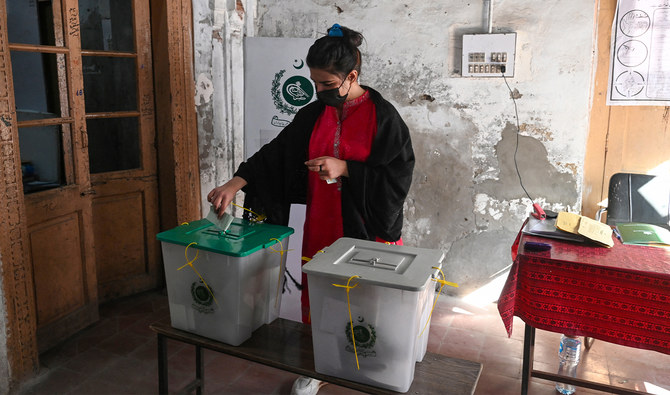
- FAFEN says its observers were stopped from monitoring elections at 19 polling stations in two Punjab constituencies
- It mentions a decline in the number of votes cast despite an overall increase in registered voters since February 8
ISLAMABAD: An independent election monitoring network in Pakistan highlighted low voter turnout and procedural irregularities in provincial constituencies in Punjab on Tuesday, saying such teething issues dominated improved result management in the by-polls held on April 21.
Established in 2006, the Free and Fair Election Network (FAFEN) aims to promote electoral transparency, integrity and fairness in Pakistan through citizen observation and advocacy efforts.
It operates independently, monitoring various aspects of the electoral process, including voter registration, polling procedures and result tabulation to ensure impartial elections in the country.
“Low voter turnout, procedural irregularities and restrictions on independent observation in two provincial constituencies in Punjab overshadowed the improved results management and lower numbers of ballots excluded from the count during April 21 elections in 22 national and provincial assembly constituencies,” FAFEN said in its report on by-elections.
“Polling station establishment, voter identification, and counting at polling stations were observed to have been largely compliant with law and procedures,” it continued. “However, instances of omissions in ballot issuance requirements by Assistant Presiding Officers (APOs) were reported from around 14 percent of the observed polling stations.”
FAFEN said while polling agents and accredited observers could generally access voting and counting process, security officials or Presiding Officers barred its observers at 19 polling stations in PP-36 Wazirabad and PP-22 Chakwal-cum-Talagang.
“In PP-22, the accreditation process of FAFEN observers was also delayed until the midday on the polling day causing last-minute changes in the observation scope,” it added.
The report said nearly 36 percent of registered voters cast their votes on polling day, which was nine percent less than the turnout in 18 of these constituencies on February 8.
Votes polled by women decreased by 12 percent, while votes polled by men declined by nine percent, despite an increase of 75,640 registered voters, including 37,684 men and 37,956 women compared to the general elections.
“Lahore’s five constituencies recorded the sharpest decline in the voter turnout with PP-147 reporting a mere 14 percent as against 35 percent on February 8,” it noted. “Similarly, NA-119 Lahore registered a 19 percent turnout against 39 percent on February 8. However, the voter turnout in Gujrat and Khuzdar constituencies recorded an increase compared to general elections.”
FAFEN said it deployed 259 Election-Day observers, including 187 men and 72 women, to observe the voting and counting processes at 1,036 polling stations in five National Assembly and 17 Provincial Assembly constituencies in Punjab, Balochistan and Khyber Pakhtunkhwa provinces.
It said that its report was based on the observations received on Election Day from 532 polling stations through FAFEN Election Day Observation mobile application.
US warns of sanctions risk as Iran, Pakistan agree to boost trade ties with new agreements
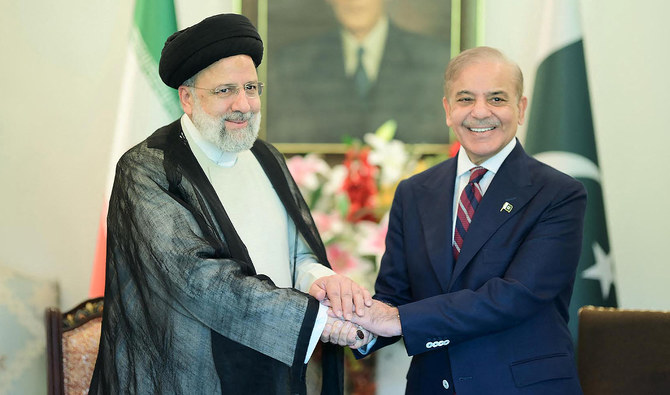
- State Department statement came as the Iranian president concluded his Pakistan visit to discuss energy and connectivity
- US also defends its decision to impose sanctions against four international entities supplying missile components to Pakistan
ISLAMABAD: The United States warned on Wednesday countries doing business with Iran faced the “potential risk of sanctions,” as President Ebrahim Raisi concluded a three-day visit to Pakistan where his government signed eight memoranda of understanding (MoUs) for cooperation in different fields and to boost trade to $10 billion.
The Iranian president arrived in Islamabad on Monday as the two Muslim neighbors sought to mend ties after unprecedented tit-for-tat military strikes earlier this year. The visit also took place as tensions continued to remain high in the Middle East after Iran launched airstrikes on Israel a week ago and Israel retaliated with its own attack on Friday.
During his stay in Pakistan, Raisi held several official meetings in Islamabad, Lahore and Karachi to discuss issues related to trade, connectivity, energy and people-to-people contacts.
Asked about his engagements in Pakistan and signing of MoUs, US State Department Deputy Spokesperson Vedant Patel cautioned against possible sanctions in a brief response.
“Just let me say broadly, we advise anyone considering business deals with Iran to be aware of the potential risk of sanctions,” he said. “But ultimately, the Government of Pakistan can speak to their own foreign policy pursuits.”
He was also asked about the US administration’s decision to announce sanctions against three Chinese and one Belarus-based entity supplying missile components to Pakistan last week.
“The sanctions were made because these were entities that were proliferators of weapons of mass destruction and the means of their delivery,” Patel said. “These were entities based in the PRC [Peoples Republic of China], in Belarus, and that we have witnessed to have supplied equipment and other applicable items to Pakistan’s ballistic missile program.”
“We’re going to continue to disrupt and take actions against proliferation networks and concerning weapons of mass destruction procurement activities wherever they may occur,” he added.
Pakistan, China sign multiple MoUs focusing on flood rehabilitation, IT and development
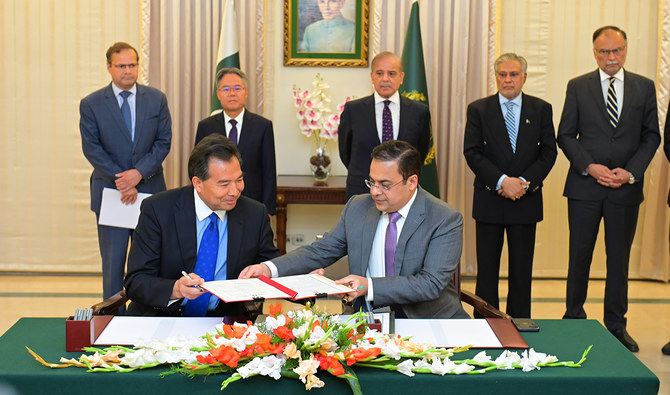
- Agreements were signed during meeting of Chinese International Development Cooperation Agency officials with PM Sharif
- Pakistan PM commended CIDCA for its vital support during 2022 floods that killed 1,739 people, caused $30 bln losses
ISLAMABAD: Pakistan and China on Tuesday signed multiple memorandums of understanding (MoUs) that focused on flood rehabilitation, information and communication technologies, and development, Pakistani state media reported.
The agreements were signed during a meeting between a high-level delegation of the Chinese International Development Cooperation Agency (CIDCA), led by Luo Zhaohui, and Prime Minister Shehbaz Sharif in Islamabad.
The MoUs pertained to flood rehabilitation, information and communication technologies, Juncao technology to address soil erosion and desertification, and China-Pakistan Development Cooperation Planning (2024-2028).
“Welcoming the delegation, the Prime Minister said China is Pakistan’s most trusted friend and appreciated China’s steadfast support to Pakistan,” the state-run Radio Pakistan broadcaster reported.
“Acknowledging CIDCA’s pivotal role in bolstering Pakistan’s economic development, the Prime Minister specifically commended CIDCA for its vital support during the 2022 floods and for its relief, rehabilitation, and reconstruction efforts in Pakistan.”
In 2022, downpours swelled rivers and at one point flooded a third of Pakistan, killing 1,739 people. The floods also caused $30 billion in damages, from which Pakistan is still trying to rebuild.
The prime minister witnessed the signing of agreements alongside a Letter of Exchange on the establishment of a First Aid Center in Balochistan and Protocol on Cooperation in Human Resources Development under the Global Development Initiative.
“These agreements signify the deepening cooperation between Pakistan and China across various sectors,” the report read.
The meeting was also attended by China’s Ambassador to Pakistan Jiang Zaidong, members of PM Sharif’s cabinet and senior officials of Pakistan.
Beijing has been one of Islamabad’s most reliable foreign partners in recent years, readily providing financial assistance to bail out its often-struggling neighbor.
In July last year, China granted Pakistan a two-year rollover on a $2.4 billion loan, giving the debt-saddled nation much-needed breathing space as it tackled a balance-of-payments crisis.
China has inked more than two trillion dollars in contracts around the world under its Belt and Road investment scheme, with billions pouring into infrastructure projects in Pakistan.










